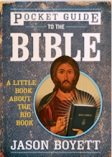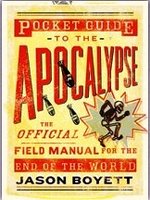 What is your background & what led you to write the pocket guide series?
What is your background & what led you to write the pocket guide series?In college, I majored in English and worked in journalism. After graduating, I was able to start freelance copywriting for a few advertising/marketing agencies. That turned into a full-time copywriting job with a local company, which then blossomed into a positive as creative director. I did that for several years, and along the way, got involved writing for Relevant Media Group when they were first getting started. I began writing free content for their website while they were getting Relevant Magazine off the ground. Before long, that relationship developed into opportunities to write books for them.
I wrote the Pocket Guide series because, as a writer, I’ve always been interested in doing two things: entertaining people and educating people, hopefully at the same time. Which, to be honest, is what an advertising copywriter tries to do. You want to capture someone’s attention in order to get them thinking about a product or company or event or whatever. So with this series of books, I tried to take big religious concepts — like the End Times or the Bible — and introduce them to my audience with a lot of humor and entertainment value. I wanted the reading process to be an enjoyable one. And then when you finish, you realize you’ve learned something along the way.
 If your readers could only take one idea away from your book, what would you like it to be?
If your readers could only take one idea away from your book, what would you like it to be?In reference to Pocket Guide to the Bible, you mean? I hope they come away from it with the idea that the Bible is less boring than they might remember it to be. I hope they finish my book with a new, fresh interest in the Bible — enough interest to actually read it. As profoundly influential as the Bible is (in both the Christian world and secular Western society), few of us are as familiar with it as we should be. Including me. Most of us know the Christmas Story and a little bit about Jesus’ life. We’ve read some of Paul’s letters. We have a couple of favorite Psalms and we’re well aware of the Creation story. But that’s it — maybe five percent of Scripture? And yet, as Christians, we’re supposed to base our lives around the teachings of the Bible. We’re supposed to follow the example of the Christ it reveals to us. We ought to be a wee bit more knowledgeable about it, right?
Even if we were to set aside the doctrine of the Bible’s authority to believers (which, of course, I wouldn’t want to do), the Bible tells a fascinating story. It isn’t this stuffy, pious, gold-lined book we remember from Sunday School. It’s more gritty, surprising, and interesting than we think.
What authors have influenced your writing &/or your spiritual life?
I grew up Southern Baptist, yet my spiritual life has largely been influenced by writers outside that tradition. Dallas Willard. Richard Foster. Brennan Manning. N.T. Wright. C.S. Lewis. Phillip Yancey. Henri Nouwen. I’m really into Scot McKnight’s work right now, as well as Robert Farrar Capon.
I’m afraid the influencers of my writing style are, um, much less impressive. I’m a copywriter by trade, and so you won’t often find real florid sentence structure or poetic turns of phrase in my books. I try to keep things snappy. Which is why I owe much of my humor and syntax to good television writing. My biggest influences are probably the snarky dialogue of the TV show “Friends,” along with the idiosyncratic language of “Buffy the Vampire Slayer” and other Joss Whedon shows. With a little Dave Barry-influenced humor thrown in for good measure.
 Are your books like children (you love them all equally) or do you have a favorite? Why?
Are your books like children (you love them all equally) or do you have a favorite? Why?No, I definitely have favorites: Pocket Guide to the Apocalypse and Pocket Guide to the Bible. Neither of them are perfect, but I really enjoyed researching and writing both of them, and I feel like they both bring that mix of education and entertainment to those big topics. They’re the kind of books I feel like I was born to write.
You have worked with two other people I will be interviewing. What draws you to write for Cameron Strang’s Relevant Magazine & what was the process like in teaming with Margaret Feinberg (among others) for “Cheap Ways To...”?
Well, I’ve written for Cameron since the early, early days of Relevant. I first heard about his enterprise in late 2001, and started writing for him in early 2002. What I liked (and still like) about Cameron is that he knew his audience and knew how to speak to that audience and was willing to lay it all on the line in order to do so. When Relevant was just getting started, no one was really addressing the twentysomething market, especially not from a spiritual perspective. But he did (and continues to do so), using pop culture as our common denominator. I think Relevant has been pretty influential in that regard. That’s why I love Relevant Magazine. On one page is an interview with Sufjan Stevens and the next page is a story about Darfur and the next page is an in-depth article on how prescription ADHD meds can help you focus your spiritual life.
I met Margaret in the process of working on my first book, Cheap Ways to…, in 2002. It was a collaborative effort. Margaret and I were contributors to it, along with my good friend Katie Meier and Josh Hatcher. It was one of Relevant’s earliest books. At the time, Margaret already had a couple of books under her belt, and ended up being such a great professional resource as I was getting my feet wet in publishing. There wasn’t a lot of direct teamwork involved — we all wrote separate, unrelated chapters — but in the process I got to know her and began to rely on her writing expertise and experience in the industry. I’m thrilled that she’s gone on to bigger and better things. She’s such a prolific author and speaker, I continue to be impressed by her output. Plus, she lives in Alaska, so that makes her sorta mysterious.
 Who did you have in mind when you write?
Who did you have in mind when you write?Other than A Guy’s Guide to Life, which was written for teenagers, all of my books are aimed squarely at the twentysomething and young-thirtysomething demographic. My ideal reader is probably in college or a college graduate, is a little bit jaded about organized religion (but still interested in spirituality), and has a highly developed awareness of pop culture. Then again, my 86-year-old grandmother seems to really like my books, too, so maybe my readership isn’t quite that narrow.
You write “A Guy’s Guide to Life” to help becoming a man a little easier. What or who helped you in that area?
Good role models and good friends. I’ve always been blessed to have a large extended family. I’ve grown up around my grandparents all my life, and have always been close to my parents. And I grew up as a well-behaved, active church kid, so I never really went through the big, rebellious, hormone-crazed stage that lots of guys go through. My friends and I struggled through it together, and somehow made it through relatively unscathed. However, I never really had an adult I felt like I could ask the big puberty questions of. My dad and I were close…except when it came to the sex/puberty stuff. I didn’t feel comfortable talking to him about it. That’s one reason I wrote the Guy’s Guide — to answer some of those questions younger guys are afraid to ask.
You seem to be quite interested in social justice. Can you tell me what brought that to your attention & specifically which cause ignites passion in you the most?
Two things piqued my interest in social justice, and I can tell you exactly what they are and when they occurred. The first was the birth of my daughter, Ellie, in April 2000. The second was the Indian Ocean tsunami the day after Christmas in 2004. When the tsunami happened, I had been reading and studying about the Kingdom of God, which Jesus keeps on talking about in the Gospels. Specifically, I was learning about the idea that part of Christ’s mission was not only to bring personal salvation, but to introduce a larger, societal focus — the rectifying of injustices like poverty and oppression and hunger. Like the Lord’s Prayer says: “Thy will be done on earth as it is in heaven.” With the tsunami, I began to see the devastation it had on some of the world’s poorest people. As a father, I couldn’t help but look at that drama and violence and place my child in that hopeless situation. Once you do that, people become much more than numbers or statistics. You don’t see some anonymous African kid standing in a doorway, you see your own kid. What if Ellie lived in that poverty? What if Ellie was exposed to that violence? What if Ellie lived under the threat of that disease? What if my Ellie lost both her parents to AIDS?
Wrap it up in that perspective and it becomes impossible not to care about injustice. And once you begin studying the Bible from that perspective, you see how often it speaks to that very issue.
As for specific causes, I’m a big fan of Compassion International. My wife and I have sponsored a child through Compassion since we got married 12 years ago. Our first little boy “graduated” out of the program, so now we’re on our second sponsored child. Her name is Maria and she lives in Columbia. Compassion’s ideal of lifting children out of poverty in Jesus’ name is very appealing to me.
 Another organization I’m passionate about is Healing Waters International. This is a smaller non-profit that’s addressing the issue of clean drinking water in developing countries, and it’s doing it through local churches. Clean drinking water is such a problem in our world. It’s the kind of thing I totally take for granted, but when it’s unavailable — when the water that comes through the tap is contaminated, or when actually getting water is so inconvenient — your life revolves around. You get sick and stay sick. Sick kids can’t learn. Sick parents can’t care for their children, or they’re spending all day searching for clean water. With 1.1 billion people in the world without access to clean water, it’s not an issue the church can really ignore.
Another organization I’m passionate about is Healing Waters International. This is a smaller non-profit that’s addressing the issue of clean drinking water in developing countries, and it’s doing it through local churches. Clean drinking water is such a problem in our world. It’s the kind of thing I totally take for granted, but when it’s unavailable — when the water that comes through the tap is contaminated, or when actually getting water is so inconvenient — your life revolves around. You get sick and stay sick. Sick kids can’t learn. Sick parents can’t care for their children, or they’re spending all day searching for clean water. With 1.1 billion people in the world without access to clean water, it’s not an issue the church can really ignore.Healing Waters is focused on working to address the water problem among the urban poor. Often, they have access to a water infrastructure, but the water that comes out is just full of parasites and amoebas. So Healing Waters installs water purification systems in places like the Dominican Republic. The systems are operated by neighborhood churches, so the people in the church’s neighborhood are able to come to the church to get clean water. This puts the church in the position of serving its community and meeting the needs of the people around them, whether they attend the church or not. It’s a brilliant concept and one of my favorite organizations.
What do you see as a crucial topic facing the evangelical church at large today?
I think it’s a lack of interest in the church among my generation and the generations following us. The latest Barna numbers indicate that a majority of twentysomethings are disengaging with the institutional church after their teen years. They may retain a very real commitment to faith and spirituality, but it’s not always wrapped up in a connection to a local church. For a lot of us, we see the evangelical church getting caught up in politics or culture wars or trying to be this big Boomer-focused Sunday Jesus show, and it just doesn’t feel right. It’s too much of an institution and not “authentic” enough, to use a popular generational buzzword. Getting the younger generations re-engaged with church is going to be a major issue down the road for evangelicals, and it’s a major issue now.
 Do you have anything in the works currently which we can look forward to?
Do you have anything in the works currently which we can look forward to?In early October, Relevant is publishing a book I contributed to, called Relevant Nation. It’s a bunch of profiles of young people out making a difference in the world, with a real social justice bent. I wrote a handful of those profiles.
Other than that, I’m not currently working on a specific book project, though I suspect I have one more “Pocket Guide”-style book left in me. Right now I’ve been focusing on some magazine journalism, doing a little speaking, and enjoying the lack of a big book deadline hanging over my head.





No comments:
Post a Comment